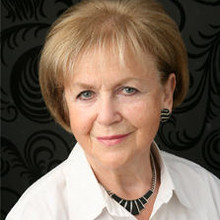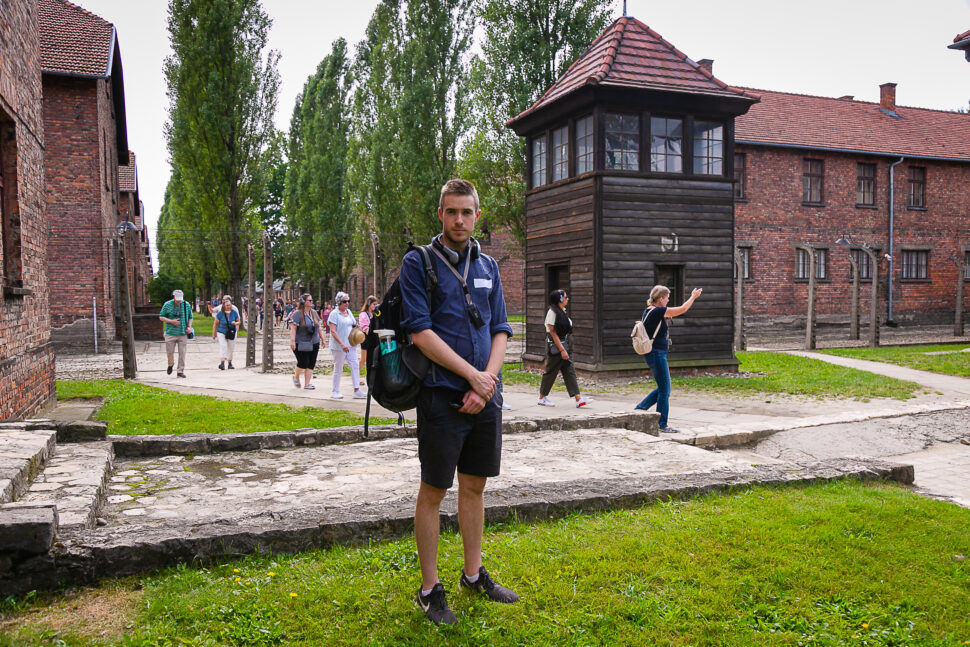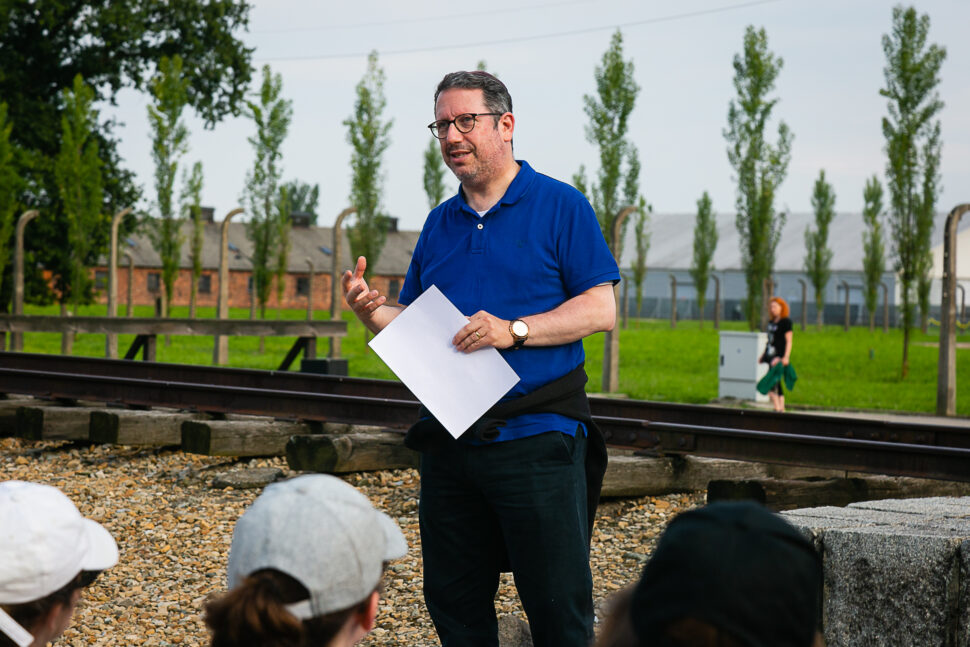“My cousin and I couldn’t recognise each other. When you’re stripped of looks and personality, you aren’t yourself anymore. You lose hope.”
Holocaust survivor Mala Tribech was describing the moment her 14-year-old self, forced into a striped uniform and head newly shaven, entered the Ravensbrück concentration camp.
“People there were like skeletons, shuffling along aimlessly. There were piles of decaying, naked corpses.”
Five months later, Allied victory meant liberation. After such nightmarish conditions, one of the first things that made the Pole feel “human again” was an unlikely camp delivery – lipstick.
Tribech, now 91, shared her testimony as part of the Holocaust Education Trust’s government-funded Lessons from Auschwitz programme.
Some 41,000 teachers and students have taken part since its 1999 launch, hearing survivors speak, attending expert seminars and visiting Auschwitz-Birkenau itself.

Schools Week took part in the first teacher visit since the pandemic last week, with the trust now recruiting for both CPD and post-16 student programmes this autumn.
It comes as a Community Security Trust report reveals more than 100 anti-semitic incidents are reported every month in Britain – and a growing proportion of victims and culprits are under 18.
Children were behind one in five incidents since January, and almost half of those involved “Holocaust- or Nazi-related rhetoric”. At least 23 children have been assaulted.
The charity fears social media could be fuelling “increased exposure to extremist beliefs and conspiracy theories”.
Karen Pollock, HET’s CEO, said it showed how “vital” proper Holocaust education was, “showing where antisemitism can ultimately lead”.
Mountains of hair underline horrors’ scale
The Holocaust has been compulsory in the secondary history curriculum since 1991.
But University College London researchers last year found “numerous” public misconceptions, including a “deeply disturbing” 9 per cent saying the Holocaust was a myth or exaggerated. Another poll found “widespread misunderstandings” and inaccuracies even among history teachers.
Half the public surveyed did not know the number of Jews murdered – six million.

Some 1.1 million died at Auschwitz alone. Staring at the two tons of victims’ hair in its museum, mountains of suitcases labelled with addresses across Europe, and vast railway platform where arriving families were separated, the figures become impossible to forget.
UCL’s study found “compelling evidence” of CPD’s effectiveness. And few things can rival visiting camps and hearing survivors’ stories in beginning to comprehend the horror, magnitude and lesser-known aspects of the Holocaust.
Thomas Campbell, a history teacher in Northampton, said visiting underlined Auschwitz’s “sheer enormity”, while the “sweltering heat” of cramped barracks illustrated one example of prisoners’ countless privations.
Our LFA guides also stressed how Europe-wide genocide was. Another UCL poll showed most pupils wrongly believed most Jewish victims were German.
Some 430,000 Hungarian and 300,000 Polish Jews were sent to Auschwitz, while other victims were deported from as far as Corfu.
Pupils think antisemitism ‘invented by Hitler’
UCL’s pupil survey also showed most thought Hitler was solely responsible, preventing students “seeing genocide as a societal crime” or making contemporary comparisons.
In HET’s virtual seminars, educators not only emphasise examples like camp guards, train drivers and several countries’ collaborating regimes, but also explore difficult debates about how far individuals and other governments – like Britain’s – could have done more.
There is also a common pupil misconception “Hitler and the Nazis invented antisemitism”, according to HET’s lead educator Cat Kirkland.
So the charity emphasises antisemitism’s long history. Daniel Epstein, a London rabbi who accompanied the Auschwitz trip, noted the many expulsions faced over millennia, including from England in 1290.

But they stress events were not inevitable, too.
A seminar on the Polish town of Oświęcim – from which Auschwitz gets its name – highlights how Jewish and non-Jewish residents lived largely peacefully together for centuries, before the camps were established.
Pupils sometimes ask why Jews didn’t hide or change their faith, Kirkland said, unaware they were killed “regardless of their beliefs” or behaviour.
Classroom resources include pre-war photos of poor families, not recognisably Jewish, and highlight Jews’ varied national, work and social identities – challenging assumptions of difference or wealth.
Unlikely hope amid despair
Several teachers attending said they would now teach pre-war Oświęcim, and incorporate more personal stories after hearing Tribich speak.

Many were moved too by the powerful prayer for victims Epstein recited just yards from the ruins of Auschwitz-Birkenau’s gas chambers. Some may be tempted to repeat his parting words to the group in their own classrooms.
He said he often told students humans’ capacity to think up the logistics of Auschwitz could be flipped “on its head” – showing our capacity for positive change.
If groups could be brought from as far as Norway to Auschwitz, groups can be brought today from warzones to places of freedom. “Think Afghanistan. Think Ukraine….you lift from this place of abject devastation a sense of the possibility of hope.”
Schools Week’s participation in the Lessons from Auschwitz CPD programme was funded by the Holocaust Education Trust. Auschwitz photos were taken by Yakir Zur. Find out more about HET’s projects and free resources here.
















Your thoughts